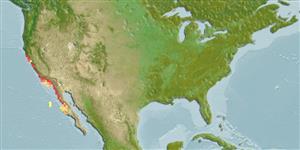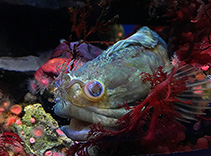Neoclinus uninotatus Hubbs, 1953
Onespot fringehead| Native range | All suitable habitat | Point map | Year 2050 |

|
| This map was computer-generated and has not yet been reviewed. |
| Neoclinus uninotatus AquaMaps Data sources: GBIF OBIS |
Pictures | Google imageNeoclinus uninotatus
Picture by DeCloux, R.
Classification / Names Common names | Synonyms | Catalog of Fishes(genus, species) | ITIS | CoL | WoRMS | Cloffa
Etymology: Neoclinus: Greek,neos = new + Greek, klinein, kline = sloping and bed, due to the four apophyses of sphenoid bone (Ref. 45335); uninotatus: Neoclinus new Clinus ; uninotatus one mark, for the single ocellatus (Ref. 4930).
Environment: milieu / climate zone / depth range / distribution range Ecology
Distribution Territories | FAO areas | Ecosystems | Occurrences | Point map | Introductions | Faunafri
Length at first maturity / Size / Weight / Age
Max length : 25.0 cm TL male/unsexed; (Ref. 2850); max. reported age: 7 years (Ref. 43439)
Life cycle and mating behavior Maturity | Reproduction | Spawning | Eggs | Fecundity | Larvae
Main reference
Upload your references | References | Coordinator : Williams, Jeffrey T. | Collaborators
IUCN Red List Status (Ref. 130435: Version 2025-2)
CITES
Threat to humans
Human uses
More information
Growth parameters
Max. ages / sizes
Length-weight rel.
Length-length rel.
Length-frequencies
Mass conversion
Recruitment
Abundance
Reproduction
Maturity
Maturity/Gills rel.
Fecundity
Spawning
Spawning aggregations
Eggs
Egg development
Larvae
Larval dynamics
Gill area
Brain
Otolith
Body composition
Nutrients
Oxygen consumption
Swimming type
Swimming speed
Visual pigments
Fish sound
Diseases & Parasites
Toxicity (LC50s)
Genome
Genetics
Heterozygosity
Heritability
Genetic Diversity
Aquaculture systems
Aquaculture profiles
Strains
Ciguatera cases
Stamps, coins, misc.
Tools
Special reports
Download XML



